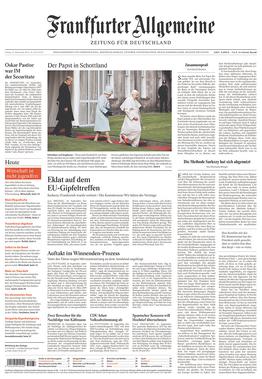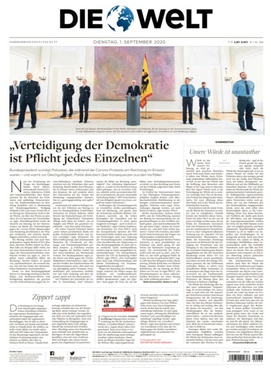
Bild is a German tabloid newspaper published by Axel Springer SE. The paper is published from Monday to Saturday; on Sundays, its sister paper Bild am Sonntag is published instead, which has a different style and its own editors. Bild is tabloid in style but broadsheet in size. It is the best-selling European newspaper and has the sixteenth-largest circulation worldwide. Bild has been described as "notorious for its mix of gossip, inflammatory language, and sensationalism" and as having a huge influence on German politicians. Its nearest English-language stylistic and journalistic equivalent is often considered to be the British national newspaper The Sun, the second-highest-selling European tabloid newspaper.

The Frankfurter Allgemeine Zeitung is a centre-right conservative-liberal and liberal-conservative German newspaper founded in 1949. It is published daily in Frankfurt. Its Sunday edition is the Frankfurter Allgemeine Sonntagszeitung.

Die Welt is a German national daily newspaper, published as a broadsheet by Axel Springer SE. Die Welt is the flagship newspaper of the Axel Springer publishing group. Its leading competitors are the Frankfurter Allgemeine Zeitung, the Süddeutsche Zeitung and the Frankfurter Rundschau. The modern paper takes a self-described "liberal cosmopolitan" position in editing, but it is generally considered to be conservative.

Herbert Achternbusch was a German film director, writer and painter. He began as a writer of avant-garde prose, such as the novel Die Alexanderschlacht, before turning to low-budget films. He had a love-hate relationship with Bavaria which showed itself in his work. Some of his controversial films, such as Das Gespenst, were presented at the Berlinale festival.

The Nürnberger Nachrichten (NN) was originally a local daily in the Nuremberg-Erlangen-Fürth area. With its regional editions, it covers the whole of Middle Franconia and parts of Upper Franconia and the Upper Palatinate and is one of Germany's large regional newspapers. The Nürnberger Zeitung belongs to the same group but is editorially independent.

The Süddeutsche Zeitung, published in Munich, Bavaria, is one of the largest daily newspapers in Germany. The tone of SZ is mainly described as centre-left, liberal, social-liberal, progressive-liberal, and social-democrat.

Gustl Ferdinand Mollath is a German man who was acquitted during a criminal trial in 2006 on the basis of diminished criminal responsibility; he was committed to a high-security psychiatric hospital, as the court deemed him a danger to the public and declared him insane based on expert diagnoses of paranoid personality disorder. Mollath's forensic incarceration for seven years and the surrounding legal judgments became the basis of a public controversy in Bavaria and the whole of Germany when at least some underlying elements of his supposedly fabricated paranoid story about money-laundering activities at a major bank turned out to be true after all. Mollath himself had consistently claimed there was a conspiracy to have him locked up in a psychiatric care ward because of his incriminating knowledge; evidence that turned up in 2012 made his claims appear plausible.
The Münchner Merkur is a German Bavarian daily subscription newspaper, which is published from Monday to Saturday. It is located in Munich and belongs to the Müncher Merkur/tz media group. The paid circulation of the Münchner Merkur is 271.335 copies.

The tz is a Munich-based tabloid, which belongs to the media group Münchner Merkur/tz from publisher Dirk Ippen. The tabloid's main circulation areas include Munich and the surrounding area of Upper Bavaria. Editors are the Münchner Merkur owners, Dirk Ippen and Alfons Döser, who is also CEO of Oberbayerisches Volksblatt. Chief editor is Rudolf Bögel, who before was head of local competitor Abendzeitung. The daily sales in the third quarter of 2015 were 120,533 copies, which is a decline of 19.7 percent since 1998.

The Süddeutscher Verlag (SV) is a corporate group that has emerged from the Süddeutsche Zeitung.

Sendlinger Straße is an important shopping street in Munich's city center. It extends into the Munich old town in the south-east-northeast direction from the Sendlinger Tor in the west to the point where Fürstenfelder Straße and the Rindermarkt meet in the east. In July 2016, the conversion from a one-way street into a pedestrian zone was attempted.

Andreas Bohnenstengel is a German photographer who lives and works in Munich.

The Hofstatt is a shopping mall that opened in 2013 in Munich's old town. The core of the building is the former site of the Süddeutscher Verlag, whose historical edifices are part of the design by architect Max Littmann on the Sendlinger Straße and the brick printing press building was also incorporated into the project.
The Feilitzschstraße is a roughly 450-meter-long street in Munich's Schwabing district. After the incorporation of Schwabing to Munich in 1891, it was renamed after the Bavarian State Interior Minister, Maximilian von Feilitzsch (1834–1913) in order to avoid confusion with the Maffeistraße in the old town.
Mass media in Germany includes a variety of online, print, and broadcast formats, such as radio, television, newspapers, and magazines.

The Bahnwärter Thiel is a techno club, music venue and alternative cultural center in Munich, Germany. It is named after the novella "Bahnwärter Thiel" by German author Gerhart Hauptmann.

The VAG Class DT1 is an electric multiple unit (EMU) train type operated by the Verkehrs-Aktiengesellschaft Nürnberg on the Nuremberg U-Bahn system since its opening in 1972. It is a derivative of the MVG Class A, in service on the Munich U-Bahn since 1971.

Münchner Neueste Nachrichten was a German daily newspaper published in Munich between 1848 and 1945.
Manfred Amerell was a German football Official and Referee. From 1986 to 1994, he refereed 66 games of the Bundesliga; his full-time career was hotelier.

















